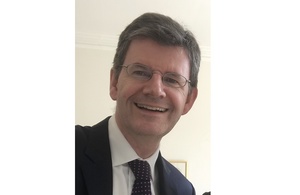Scaling up climate action: country strategies and emerging investment opportunities for a green recovery
Good morning, afternoon and evening to everybody, I’d like to thank the Climate Policy Initiative for organising this event.
It is a pleasure for me to be speaking alongside Germany’s Minister of the Environment, Svenja Schulze, and the UN Under-Secretary-General Inger Andersen.
My colleague the COP President Designate Alok Sharma expresses his apologies and with regret, I’m afraid to announce that unforeseen circumstances have resulted in him not being able to attend this event.
The fact that I am speaking from my own department here in London is a reminder of the unprecedented times we are living in.
2020 has seen countries across the globe take extraordinary measures to shut down large swathes of their economies in order to combat the coronavirus pandemic.
Here in the UK, we did this on the 23rd of March whilst also launching a series of major policy initiatives to protect businesses, workers and consumers through the public health emergency.
Now, as we approach the next step in the phased reopening of our economy, and as we look to recover and rebuild, we are faced with a huge opportunity.
According to the IMF, governments across the world have already provided about 10 trillion dollars for the recovery, and we are only at the start of this process.
On Tuesday this week, the UK Prime Minister unveiled an ambitious economic strategy to usher our nation into the next stage of recovery.
A ‘New Deal’ to help build the UK economy back to health.
As the Prime Minister said, this moment gives us a much greater chance to be radical and to do things differently.
To build back better.
Of course, this is not just an opportunity for the UK, but for every country.
We all have an opportunity to create a fairer, a greener and a more resilient global economy.
And those of you attending this event today will know that we can only achieve this in partnership with business and finance.
In the last decade, globally we saw the cost of wind power fall by 49%, and that of solar power by 85%.
Renewables are already cheaper than coal power in two-thirds of all countries in the world.
This progress was only made possible through countries, companies and financial institutions coming together in partnership.
They’ve deployed investment. They’ve spurred innovation. They’ve scaled up technologies. And all ultimately working together, we have driven down costs.
But with temperatures still forecast to rise by around three degrees by the end of the century, we know that we must go further and faster to tackle climate change.
So as we look forward to COP26 next November, our aim is to increase ambitions towards a climate-resilient, zero-carbon economy.
We want all nations to submit more ambitious Nationally Determined Contributions, committing to further cuts in carbon emissions by 2030 and to reaching net zero as soon as possible.
As the UK’s Minister for Business, Energy and Clean Growth, I have seen many excellent examples of countries working together to drive up ambition.
Minister Schulze will know of the Nationally Appropriate Mitigation Action Facility, or NAMA, which is a great example of UK-Germany cooperation and leadership in this area.
Through the NAMA Facility we have invested nearly half a billion Euros in clean energy, electric buses and sustainable farming projects across Africa, Asia and South America.
And I’m pleased to say that, alongside our German friends, we will soon expand this successful programme to launch a special funding window for projects focused on raising NDC ambition in the aftermath of Covid-19.
With this commitment, we will support countries to implement ambitious NDCs and take hold of this unique opportunity to rebuild sustainable and resilient economies.
At this moment, let me pause to mention those countries that have already come forward with improved NDCs. They include the Marshall Islands, Chile, Norway, Rwanda, and yesterday’s newest member for this esteemed group, Jamaica.
Welcome to you all. Thank you for the leadership you have already shown.
The UK will come forward with our own more ambitious NDC as soon as possible.
And I look forward to our friends and comrades around the world showing just as much ambition when they submit their new NDCs and Long-Term Strategies.
Ahead of COP26 we have outlined five areas which need particular attention: clean energy, clean transport, nature-based solutions, adaptation and resilience, and tying everything together, finance.
I list finance last because it really is the key to unlocking all further progress.
The OECD estimates that we will need nearly 7 trillion dollars a year up to 2030 to meet the Paris Agreement and the Sustainable Development Goals.
Last year at the UN, our Prime Minister announced a doubling of the UK’s international climate finance commitment to 11.6 billion pounds over 2021 to 2025.
This, in turn, will mobilise further finance from public and private sources.
Helping us meet, and indeed move beyond the 100-billion-dollar goal.
Many of the Multilateral Development Banks represented here today are also looking to align their portfolios with the Paris goals, and I hope we can all work together on this important journey.
As the UK takes up the COP Presidency, we are calling on our international development partners to show similar ambition in their future climate finance, looking ahead to the Finance in Common Summit our French colleagues are hosting in November.
Today I can announce that the UK’s own Development Finance Institution, the CDC, has published an ambitious Climate Strategy.
This strategy sets out a comprehensive approach to align all of the CDC’s activities with the Paris Agreement, based on the core principles of reaching net zero by 2050, enabling a just transition whilst strengthening adaptation and resilience.
But of course, public finance alone will not reach the scale needed to drive the transition.
To move from billions to trillions, we will need all finance to align with the Paris Agreement.
In February, my colleague the COP President Designate joined Mark Carney to launch the COP26 Private Finance Action Plan to help private finance support the global economy transition to net zero.
The BlackRock report has stated global sustainable funds have attracted more than 30 billion pounds in the first three months of 2020 – that is an increase of more than 40 percent year-on-year.
This is just one example of the huge momentum that is gathering behind this transition.
And in the lead up to COP26, we want to build on that momentum.
We want all financial institutions to commit to net zero targets, with clear transition plans detailing exactly how they mean to get there.
And today, banks, insurers, pension funds and investors with balance sheets of 139 trillion dollars combined are demanding that the sector engages with the Taskforce on Climate-Related Financial Disclosures.
We have seen over four fifths of the top 1100 global companies now disclosing climate-related financial risks in line with some of the TCFD recommendations.
To take this further, I am asking all financial institutions listening today to commit to reporting a full set of TCFD disclosures in their next reporting round, and to demand TCFD-consistent disclosures from their borrowers and portfolio companies.
This I believe, will send a hugely powerful signal that the private sector is ready and willing to support the climate transition, including in developing countries.
Ladies and gentlemen, we all have a part to play in our planet’s future.
So I really hope and trust we can use this event to drive the conversation forward and together endeavour to build a fairer, greener economy.
Thank you all very much.

